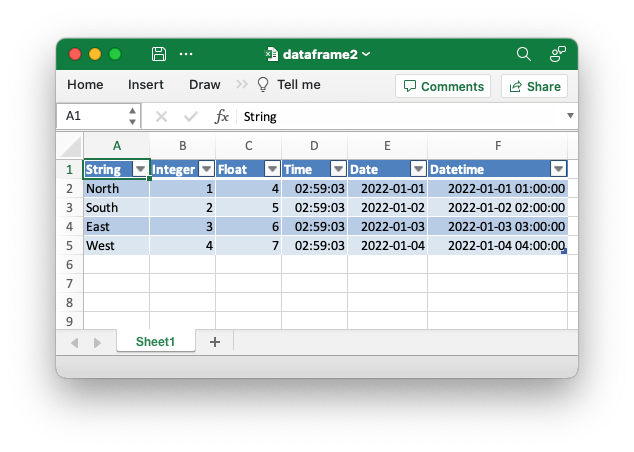13 breaking releases
| new 0.14.0 | May 2, 2025 |
|---|---|
| 0.13.0 | Mar 15, 2025 |
| 0.12.0 | Jan 29, 2025 |
| 0.9.0 | Sep 17, 2024 |
| 0.4.0 | Nov 22, 2023 |
#14 in #xlsx
49 downloads per month
Used in pq2xl
105KB
427 lines
polars_excel_writer
The polars_excel_writer crate is a library for serializing Polars dataframes
to Excel Xlsx files.
It provides a primary interface PolarsXlsxWriter which is a configurable
Excel serializer that resembles the interface options provided by the Polars
write_excel() dataframe method.
It also provides a secondary ExcelWriter interface which is a simpler
Excel serializer that implements the Polars SerWriter trait to write a
dataframe to an Excel Xlsx file. However, unless you have existing code that
uses the SerWriter trait you should use the PolarsXlsxWriter
interface.
Unless you have existing code that uses the Polars SerWriter trait you
should use the primary PolarsXlsxWriter interface.
This crate uses rust_xlsxwriter to do the Excel serialization.
Example
An example of writing a Polar Rust dataframe to an Excel file using the
PolarsXlsxWriter interface.
use chrono::prelude::*;
use polars::prelude::*;
use polars_excel_writer::PolarsXlsxWriter;
fn main() -> PolarsResult<()> {
// Create a sample dataframe for the example.
let df: DataFrame = df!(
"String" => &["North", "South", "East", "West"],
"Integer" => &[1, 2, 3, 4],
"Float" => &[4.0, 5.0, 6.0, 7.0],
"Time" => &[
NaiveTime::from_hms_milli_opt(2, 59, 3, 456).unwrap(),
NaiveTime::from_hms_milli_opt(2, 59, 3, 456).unwrap(),
NaiveTime::from_hms_milli_opt(2, 59, 3, 456).unwrap(),
NaiveTime::from_hms_milli_opt(2, 59, 3, 456).unwrap(),
],
"Date" => &[
NaiveDate::from_ymd_opt(2022, 1, 1).unwrap(),
NaiveDate::from_ymd_opt(2022, 1, 2).unwrap(),
NaiveDate::from_ymd_opt(2022, 1, 3).unwrap(),
NaiveDate::from_ymd_opt(2022, 1, 4).unwrap(),
],
"Datetime" => &[
NaiveDate::from_ymd_opt(2022, 1, 1).unwrap().and_hms_opt(1, 0, 0).unwrap(),
NaiveDate::from_ymd_opt(2022, 1, 2).unwrap().and_hms_opt(2, 0, 0).unwrap(),
NaiveDate::from_ymd_opt(2022, 1, 3).unwrap().and_hms_opt(3, 0, 0).unwrap(),
NaiveDate::from_ymd_opt(2022, 1, 4).unwrap().and_hms_opt(4, 0, 0).unwrap(),
],
)?;
// Create a new Excel writer.
let mut xlsx_writer = PolarsXlsxWriter::new();
// Write the dataframe to Excel.
xlsx_writer.write_dataframe(&df)?;
// Save the file to disk.
xlsx_writer.save("dataframe.xlsx")?;
Ok(())
}
Output file:

See also
- Changelog: Recent additions and fixes.
- Performance: Performance comparison with Python based methods.
Dependencies
~27–37MB
~606K SLoC